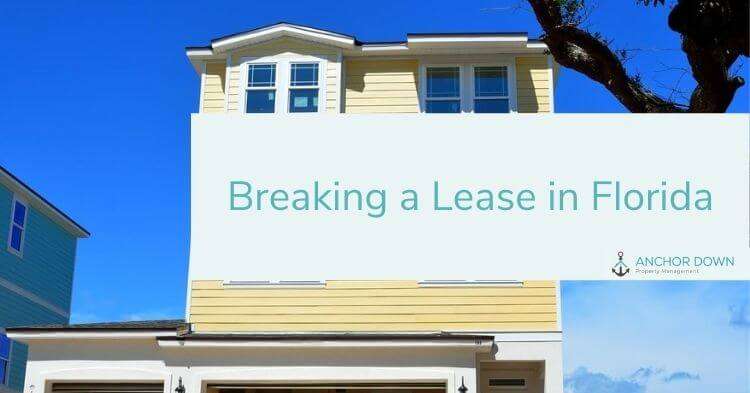
The stated intention behind any lease is for the tenant to stay for the entire period it’ll be active. But life happens, and that may compel a tenant to move out before the lease has expired. For example, a tenant may need to move out to get closer to their new job or to move in with their lover. In some fields of employment there are changes that require relocation, such as deployment or change of station orders.
Depending on the reason given, breaking a lease may have serious consequences, which is just one reason why it’s important to make yourself familiar with the Landlord-Tenancy Act.
Here are some consequences of breaking a lease improperly:
- You could have a hard time finding your next apartment. Landlords conduct background searches, and a history of breaking leases is a red flag.
- Your credit score could get hurt. If you move out without paying all rent due under the lease, your landlord could report you to a debt collection agency. This could then impact your ability to get new loans or rental contracts.
- Your landlord could sue you. A lease is a legal agreement that binds you and your landlord for a certain period of time. By breaking it, your landlord could be well within their rights to take you to court for not upholding your end of the contract.
- Your ability to get your security deposit back could be affected.
- You risk facing hefty fees. Generally, breaking a lease attracts some financial penalties. Sometimes the fee is equivalent to one or two months’ rent. Other times, you could need to shoulder the entire rent remaining under the lease.
When Breaking a Lease isn’t Legally Justified in Florida
The trickiness of adhering to lease clauses is one of many reasons why property owners often choose to work with property management companies. The following reasons are generally not adequate justification for a tenant to break a lease.

Because these reasons don’t offer legal protection, you could face penalties for not honoring the lease agreement:
- Relocating to Get Closer to School or a New Job
- Buying Yourself a New Home
- Deciding to Upsize or Downsize.
- Moving in with a Lover.
- Wanting to Get Closer to Your Family.
Legal Reasons to Break a Lease
In some cases, breaking a lease doesn’t attract legal or financial repercussions. The following are the instances:
1. Landlord Harassment
Landlord harassment is illegal in Florida, like most everywhere else. Landlord harassment generally falls into two categories: landlord entry and “self-help eviction.”

Landlord entry: As a landlord, you are required to notify your tenant prior to entering their rented premises. Different states have different notice periods. In Florida, it is 12 hours, unless otherwise agreed upon by both parties. § (83.53(2)).
Self-help eviction: You may also be able to break the lease if your landlord performs certain illegal actions. Examples include changing the locks, turning off your utilities, or removing windows or doors. [Fla. Stat. Ann. § (83.67(2))].
2. Unit Uninhabitability
Every state, including the state of Florida, specifies basic health and safety codes. If those standards aren’t met, a court would probably rule that you have been “constructively evicted.”
According to Fla. Stat. Ann. § 83.60, it’s the responsibility of every Florida landlord to provide habitable rental premises. For instance, on the most basic level, a building must have doors, windows, a roof, steps, and a foundation in good repair and working condition.
3. Active Military Duty
Have you been deployed or received change of station orders? If you have, you may be able to get out of the lease without further obligations thanks to the Servicemembers Civil Relief Act (SCRA).

But before you can break the lease, there are three things you must do. One, you must prove that you entered active duty prior to signing the lease agreement. Two, you must prove that you’ll remain in active duty for at least the next ninety days. And three, you must notify the landlord in writing of your intention to move out.
The term ‘servicemember’ means members of the following disciplined forces:
- Armed forces
- Activated National Guard
- Commissioned corps of the Public Health Service
- Commissioned corps of the National Oceanic and Atmospheric Administration (NOAA)
4. Early Termination Clause
These days, some leases contain clauses that permit early lease termination in exchange for a fee. The fee is usually the equivalent of two months’ rent.
So, before breaking your lease, read over the fine print to check whether there is an early termination clause.
5. Lease Violation
Has your landlord violated a provision in the lease agreement? If they have, that may be a sufficient reason to break the lease. An example of a common violation is raising the rent mid-way through the lease.
Raising rent before the existing term of a fixed-term lease is illegal (unless the lease allows it).
Landlords need to remain vigilant about lease terms to avoid adverse possession and other squatting situations.
6. Mandatory Disclosures
Before signing the lease, your landlord is required by law to make certain information known to you. For instance, they have to let you know the identity of the landlord, if radon gas is present, what fire protections are available, and information regarding the security deposit.
Landlord’s Duty to Find a Replacement Tenant in Florida
In some other states, landlords are required to make reasonable efforts to find a replacement tenant when a tenant breaks a lease, instead of charging a tenant for the entire rent remaining in their leases.
Unfortunately for tenants, this isn’t the case in the state of Florida, where landlords don’t have a responsibility to “mitigate damages.” In other words, your landlord can pretty much just stand by and do nothing (in which case, you remain liable for the rent as it becomes due).

Therefore, if you really have to break your lease without a legal justification, try working something out with your landlord. If that fails, then consider your options. That is, you’ll probably have to either pay all rent due under the lease or find a replacement tenant.
In the latter option, please note that the replacement tenant must meet the landlord’s screening criteria. They must also have good credit and references.
Do you still have more questions or need further clarifications? If so, consider seeking help from a qualified attorney or a property management company like Anchor Down Property Management.
Anchor Down Property Management is a qualified property management company that specializes in the Sarasota / Bradenton areas.
